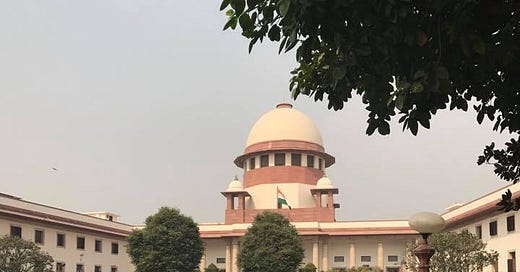Interim Bail Eludes Kejriwal in Supreme Court
Coverage of the post-lunch session; hearing resumed at 2:00 PM. Kejriwal in Supreme Court: Quasi-Realtime Coverage {Part 4, concluding part}
Bench Appeared Inclined to Grant Interim Bail but Faced Strong Opposition
Despite the Bench's overall inclination to grant interim bail albeit with stringent conditions, such an order did not materialise due to the fierce opposition by the Enforcement Directorate's legal team. As Justices Sanjiv Khanna and Dipankar Datta resumed hearing arguments from Additional Solicitor General SV Raju after lunch, they sought to finalise potential bail conditions for Delhi Chief Minister Arvind Kejriwal. Although the Bench initially appeared inclined to impose restrictions barring Kejriwal from signing official files, Solicitor General Tushar Mehta and ASG Raju fought to secure rigorous terms, aiming to limit Kejriwal's influence on administrative processes while on bail. ultimately, no interim bail order fructified for Kejriwal today, contrary to widespread expectation.
Summary of Post-Lunch Proceedings
Debating Precedent and Political Considerations
The Solicitor General Tushar Mehta cited the minority view from Ansari's judgment, attempting to persuade the court against granting interim bail. However, Justice Khanna maintained that the majority view holds sway, noting that conviction brings about irreversible consequences that differ from this situation. Justice Datta further mentioned that the Supreme Court's approach in Arnab Goswami's case aligns with the majority view, despite Mehta asserting that the Goswami ruling was a final judgment.
Justice Khanna reiterated that the court can issue interim orders, and is not considering whether Kejriwal is a politician but instead whether exceptional circumstances warrant special treatment due to the upcoming elections. "We are not saying there has to be a different law for politicians," Khanna affirmed.
Concerns About Legal Consequences
Mehta argued that opening this door could lead to unreasonable classifications, potentially undermining prosecution efforts when other petitioners like store owners or labourers seek similar relief. He reiterated that Kejriwal, as a Chief Minister without an active ministry or portfolio, should not be granted interim bail purely based on his political role.
Singhvi reassured the Bench that Kejriwal would not sign any files if released on bail but requested that the Lieutenant Governor not refuse files requiring approval.
Investigating Associations and Statements
Raju cited Section 45 of the PMLA, insisting that its criteria must be strictly adhered to. He highlighted Kejriwal's association with Vijay Nair, stating that despite not being affiliated with the excise department or Delhi government, Nair was given access to Minister Kailash Gehlot's bungalow adjacent to the Chief Minister's residence.
He read witness statements implicating K. Kavitha, Kejriwal, Manish Sisodia, and Vijay Nair in the liquor policy case. Raju pointed out that Vijay Nair's bail was denied, and referenced Sameer Mahendru's statement.
Final Observations and Hearing Schedule
Justice Khanna wanted it to be confirmed that the earliest point at which Kejriwal's involvement became evident to the ED was on November 12, 2022. Raju argued that the investigation required thorough scrutiny under money laundering laws.
After discussions on the evidence, Justice Khanna announced that the Bench would continue the hearing, likely on Thursday or next week, given the complexities involved and the other engagements of the Bench. The decision on interim bail remains pending as the court navigates the intricacies of the case.
Over and out for the day.





